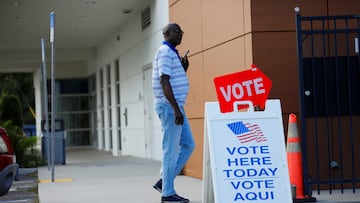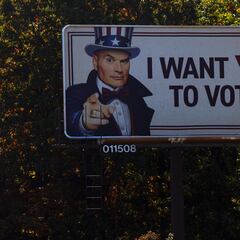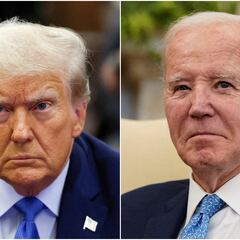Sample ballot in California: The issues and candidates you can vote on by county on Nov. 5
November is a defining month for California voters as they head to the polls to decide on statewide and local races, including ten propositions.


November is shaping up to be a defining month for California voters as they head to the polls to decide on statewide and local races, including key propositions on issues from water conservation to minimum wage hikes and criminal justice reform. It’s a packed ballot, but with each county in California hosting its own array of candidates and measures, here’s a closer look at what to expect in the Golden State come Election Day on November 5.
Follow AS’s live coverage of Election Day and the count in swing states
- Pennsylvania US Election Results 2024 live
- Wisconsin US Election Results 2024 live
- Georgia US Election Results 2024 live
- Nevada US Election Results 2024 live
- Michigan US Election Results 2024 live
- North Carolina US Election Results 2024 live
- Arizona US Election Results 2024 live
The U.S. Senate: A Key Seat Up for Grabs
California voters will face two Senate races on the ballot. The first race, for a partial term, will determine who fills out the remainder of the late Dianne Feinstein’s term. The other, a full-term race, will select the senator to represent California in Washington for the next six years, starting in 2025. Democrat Adam Schiff and Republican Steve Garvey, a former MLB star, are head-to-head in both races after a competitive primary. This Senate seat could influence the national balance of power, as the Senate’s composition hangs in the balance.
Key House Races
Several congressional districts are seeing tight races across California, with incumbents defending seats and challengers bringing fresh perspectives.
- District 1: Republican incumbent Doug LaMalfa faces Democratic challenger Rose Yee. LaMalfa is known for his conservative stances, while Yee brings a background in activism from her time in the Philippines.
- District 3: Republican Kevin Kiley and Democrat Jessica Morse face off again after Kiley bested her in a previous election. Known for his attempts to recall Governor Newsom, Kiley maintains Trump’s endorsement, while Morse has a background in national security.
- District 9: Incumbent Democrat Josh Harder is facing Stockton’s Republican mayor, Kevin Lincoln. This Central Valley district has seen increased political competition in recent years as local issues like water access and agricultural policies remain at the forefront.
State Assembly Race in District 6
With ten candidates vying for the seat, the District 6 State Assembly race has been one of the most crowded contests in California. Democrat Maggy Krell and Republican Nikki Ellis emerged as the frontrunners after the primary. Krell, a deputy attorney general, made a name for herself through her advocacy against human trafficking, while Ellis, a longtime community member, is rallying support on issues central to small businesses and local control.
Propositions on the Ballot: What’s at Stake
Voters will have a say on 10 statewide propositions, each addressing key policy issues:
- Prop 2: Requests a $10 billion loan for public school upgrades and community college improvements. Proponents argue it’s essential for modernizing California’s education infrastructure, while opponents are concerned about the potential tax burden.
- Prop 3: Proposes to remove a 2008 constitutional ban on same-sex marriage, which hasn’t been enforced since the Supreme Court’s 2013 decision.
- Prop 4: A $10 billion bond measure focused on climate and water resources, including wildfire prevention and drought preparedness.
- Prop 5: Would lower the voter threshold required for local governments to pass taxes or bonds for affordable housing or public infrastructure projects.
- Prop 6: Aims to amend the state constitution to prohibit forced labor in prisons, removing existing language allowing it as a disciplinary measure.
- Prop 32: Seeks to raise California’s minimum wage to $18 over two years, with different schedules for large and small employers.
- Prop 33: Would ease restrictions on local rent control laws, repealing parts of the Costa-Hawkins Rental Housing Act.
- Prop 34: Sets spending limits on certain healthcare providers' prescription drug revenue, focusing on providers with repeated health violations.
- Prop 35: Asks voters to make a temporary tax on health insurers permanent, specifically directing funds toward Medicaid and other healthcare programs.
- Prop 36: Proposes to increase penalties for fentanyl-related crimes, a hotly contested measure that would undo parts of the 2014 Proposition 47.
A Guide for California’s Counties
Voters in every corner of California will encounter distinct ballots shaped by their county’s unique mix of candidates and local propositions. Here’s the full list of counties where voters can expect to make critical decisions on November 5:
Alameda, Alpine, Amador, Butte, Calaveras, Colusa, Contra Costa, Del Norte, El Dorado, Fresno, Glenn, Humboldt, Imperial, Inyo, Kern, Kings, Lake, Lassen, Los Angeles, Madera, Marin, Mariposa, Mendocino, Merced, Modoc, Mono, Monterey, Napa, Nevada, Orange, Placer, Plumas, Riverside, Sacramento, San Benito, San Bernardino, San Diego, San Francisco, San Joaquin, San Luis Obispo, San Mateo, Santa Barbara, Santa Clara, Santa Cruz, Shasta, Sierra, Siskiyou, Solano, Sonoma, Stanislaus, Sutter, Tehama, Trinity, Tulare, Tuolumne, Ventura, Yolo, and Yuba.
Voting Made Simple
Related stories
California voters have multiple options for casting their ballots this year:
- Mail-In Voting: Every registered voter in California has received a mail-in ballot. Drop it in any USPS mailbox or return it in person at any ballot drop box, vote center, or county election office.
- In-Person Voting: Voters can also go to their polling place or a designated vote center for early voting or on Election Day, November 5. Polls close at 8 p.m. but any voter in line by that time can still cast their ballot.
- Ballot Tracking: For extra assurance, the Secretary of State’s website allows voters to track their ballots, from mailing to counting, with updates available via text, email, or phone.
With so many critical races and propositions, Californians’ votes this November will resonate well beyond state borders, setting the tone on issues from housing and labor rights to water conservation and criminal justice.


Complete your personal details to comment